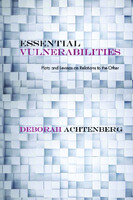Essential Vulnerabilities
Plato and Levinas on Relations to the Other
Author(s)
Achtenberg, Deborah
Collection
Knowledge Unlatched (KU)Number
101386Language
EnglishAbstract
In Essential Vulnerabilities, Deborah Achtenberg contests Emmanuel Levinas’s idea that Plato is a philosopher of freedom for whom thought is a return to the self. Instead, Plato, like Levinas, is a philosopher of the other. Nonetheless, Achtenberg argues, Plato and Levinas are different. Though they share the view that human beings are essentially vulnerable and essentially in relation to others, they conceive human vulnerability and responsiveness differently. For Plato, when we see beautiful others, we are overwhelmed by the beauty of what is, by the vision of eternal form. For Levinas, we are disrupted by the newness, foreignness, or singularity of the other. The other, for him, is new or foreign, not eternal. The other is unknowable singularity. By showing these similarities and differences, Achtenberg resituates Plato in relation to Levinas and opens up two contrasting ways that self is essentially in relation to others.
Keywords
Philosophy; Emmanuel Levinas; God; Hippias; Meno; Phaedrus (dialogue); Plato; SocratesDOI
10.2307/j.ctv3znz3rISBN
9780810129948OCN
1076638326Publisher
Northwestern University PressPublisher website
https://nupress.northwestern.edu/Publication date and place
Evanston, Illinois, 2016-12-31Series
Rereading Ancient Philosophy,Classification
Ethics and moral philosophy


 Download
Download